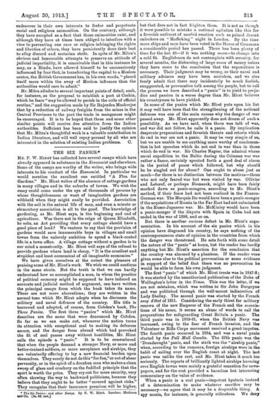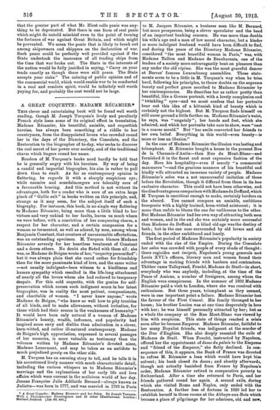THE SIX PANICS.* Mn. F. W. HIRST has collected here
several essays which have already appeared in substance in the Economist and elsewhere. Some of the essays are worthy of the writer, who brings wide interests to his conduct of the Economist. In particular we would mention the excellent one entitled "A Plea for Gardens." Mr. Hirst writes of the absence of cottage gardens in many villages and in the suburbs of towns. We wish the essay could come under the eye of thousands of persons by whose thoughtlessness or want of imagination gardens are withheld when they might easily be provided. Association with the soil is the natural life of man, and even a minute or elementary association is all to the good. The knowledge of gardening, as Mr. Hirst says, is the beginning and end of agriculture. Was there not in the reign of Queen Elizabeth, he asks, an Act providing that every cottage should have a good piece of land P We venture to say that the provision of gardens would save innumerable boys in villages and small towns from the unlovely ambition to spend a black-coated life in a town office. A village cottage without a garden is to our mind a monstrosity. Mr. Hirst well says of the refusal to provide gardens where land is cheap, " It is the cruellest and stupidest and least economical of all imaginable economies."
We have given ourselves at the outset the pleasure of praising some of Mr. Hirst's work. We wish we could continue in the same strain. But the truth is that we can hardly understand how so accomplished a man, in whom the practice of political economy might be supposed to have induced an accurate and judicial method of argument, can have written the principal essays from which the book takes its name. These are not mere aberrations; they are written in the normal tone which Mr. Hirst adopts when he discusses the military and naval defences of the country. His title is borrowed and adapted, of course, from Cobden's book, The Three Panics. The first three "panics" which Mr. Hirst describes are the same that were denounced by Cobden. So far as we can make out, whenever the nation turns its attention with exceptional zeal to making its defences secure, and the danger from abroad which had provoked the fit of zeal passes away without hostilities, Mr. Hirst calls the episode a " panic." It is to be remembered that when the people demand a stronger Navy, or more and better-trained soldiers, or more aeroplanes and airships, they are voluntarily offering to lay a new financial burden upon themselves. They surely do not do this "for fun," or out of sheer perversity, or in the spirit of a drunken man who makes a clean sweep of glass and crockery on the fuddled principle that the spirt is worth the price. They cry out for more security, very often showing the way to backward politicians, because they believe that they ought to be better " covered against risks." They recognize that their insurance premium will be higher,
• The .Sim Panics: and other Essays. 73y F. W. Hirst. London: Methuen and Co. [as. 6d. net.]
but that does not in fact frighten them. It is not as though it were possible to mistake a national agitation like this for a feverish outburst of morbid emotion such as pained decent onlookers on " Mafficking " night in London. By the time more ships and men have been voted in the House of Commons a considerable period has passed. There has been plenty of time for the hot fit—if it was nothing more—to change into a cold fit. Englishmen do not contemplate with serenity, for several months, the disbursing of large sums of money unless they have come to the conclusion that the expenditure is necessary. Their judgment may be wrong, or their naval and military advisers may have been mistaken, and we also freely admit that there may incidentally be much foolish, exaggerated, or provocative talk among the people, but to call the process we have described a "panic" is to yield to preju- dice and passion in a worse degree than Mr. Hirst believes his countrymen to have yielded.
In some of the panics which Mr. Hirst puts upon his list it may well have been that the strengthening of the national defences was one of the main causes why the danger of war passed away. Mr. Hirst apparently does not dream of such a possibility. As we have said, when there was talk of war, and war did not follow, he calls it a panic. By implication desperate preparations and feverish threats and retorts which do end in war are not a panic. It may be very simple of us, but we are unable to see anything more worthy of condemna- tion in hot speeches which do not end in war than in those which do end in war. Sir Charles Napier, the admiral whose naval expedition to the Baltic during the Crimean war was rather a fiasco, certainly spouted forth a good deal of alarm in the period of peace which followed, but why should he be singled out for abuse? One ought to abuse just as much—for there is no distinction between the motives—those who not only feared war but were visited by war. 011ivier and Lebceuf, or perhaps Bismarck, might have been fairly marked down as panic-mongers, according to Mr. Hirst's method, if their fears had not been realized in the Franco-
German war. The Marquis Ito would have been a panic-monger if the acquisitions of Russia in the Far East had not culminated in the Russo-Japanese war. Mr. McKinley would have been a panic-monger if the :dispute with Spain in Cuba had not ended in the war of 1898, and so on.
But there is another curious defect in Mr. Hirst's argu- mentation. In his account of the six panics which in his opinion have disgraced his country, he says nothing of the contemporaneous state of opinion in the countries from which the danger was threatened. He sets forth with some detail the nature of the " panic " at home, but the reader has hardly anything but Mr. Hirst's assertion for the conclusion that the country was alarmed by a phantom. If the reader were
given some clue to the political provocation or some evidence in support of the belief that there was no provocation he would be able to form his own judgment.
The first "panic" of which Mr. Hirst treats was in 1847-8; it was started by the unauthorized publication of the Duke of Wellington's letter in the Times. This was the letter, if we are not mistaken, which was written to Sir John Burgoyne and was published through the well-meant indiscretion of Lady Shelley. The second panic was started by the French coup d'etat of 1851. Considering the early thirst for military renown of the new Emperor of the French and the associa-
tions of his name, it seems an abuse of words to call the preparations for safeguarding Great Britain a panic. The third panic was in 1859-61, when the British Navy was increased, owing to the fear of French invasion, and the
Volunteer or Rifle Corps movement received a great impetus. The fourth panic occurred in 1884, and was a naval panie
started by the Pall Mall Gazette. The fifth panic was the
'Dreadnought ' panic, and the sixth was the "airship panic," when, according to the rumours, foreign airships were in the habit of sailing over the English coast at night. The last panic was unlike the rest, and Mr. Hirst takes it much too seriously. The reports of brilliantly lighted airships hovering over English towns were mainly a grateful sensation for news- papers, and for the rest provided a harmless but interesting commentary on the value of evidence.
When a panic is a real panic—impotent hysteria instead of a determination to make whatever sacrifice may be necessary—we agree that it may be a despicable thing. A spy mania, for instance, is generally ridiculous. We deny
that the greater part of what Mr. Hirst calls panic was any- thing to be deprecated. But there is one form of real panic which might do untold mischief even to the point of turning the fortunes of war against Great Britain, and which might be prevented. We mean the panic that is likely to break out among shipowners and shippers on the declaration of war. Such panic could be perfectly well provided against if the State undertook the insurance of all trading ships from the time that war broke out. The State in the interests of the nation would be fully justified in saying, " Carry on your trade exactly as though there were still peace. The State accepts your risks." The calming of public opinion and of the commercial world, which would enable war to be conducted in a cool and resolute spirit, would be infinitely well worth paying for, and probably the cost would not be large.



































 Previous page
Previous page